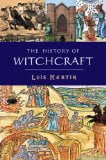 The History of Witchcraft
The History of Witchcraft
by Lois Martin
Pocket Essentials 2007, £9.99, ISBN 1-904048-77-3
There is no solid evidence that real organised witch cults ever existed. Martin shows how elements of pagan religions and folk beliefs lingered and were framed as witchcraft by the Church – a rival to be stamped out. She takes a chronological approach, showing how a new concept of the Devil emerged in the Middle Ages, along with the idea that magic could be performed only through demonic agency.
The idea of magic as a legitimate natural science was replaced by ideas of servile and heretical pacts with the Devil. Academic necromancers controlled demons while witches served them (conveniently, necromancers were mostly wealthy, well-connected men).
The idea of the coven didn’t appear until the 17th century but the Sabbat’s origins were in Roman accusations against Christians of cannibal orgies.
The magical broomstickflight to the Sabbat emerged in the 11th century, from the night ride where women rode with the goddess, generally doing good deeds.
Trials also came out of the 11th century but took a while to develop into organized seek and destroy missions with an instruction manual. Different countries framed witchcraft differently, in some it was a secular matter while in others it was tried in religious courts and, from the 13th century, by the Inquisition – which, Martin shows, used torture far less than its secular counterparts. Scotland executed three times more witches than England, for example, preferring Continental-style burning to English hanging. In more recent times, after Reason prevailed and witch hunting died out, the witch became a romanticized figure, a force of nature rebelling against the male establishment, adopted by some early feminists as an icon of female power and knowledge. Modern Wicca beliefs have little in common with Mediaeval witchcraft in which there was no white magic, only evil. There is a lot packed into this short book. It is scholarly and readable, neatly summing up the main points without skimping on detail; some of the examples of trials, accusations and significant events almost defy belief.
Tessa Kendall

